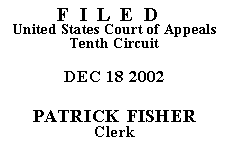 UNITED STATES COURT OF APPEALS
UNITED STATES COURT OF APPEALS
 UNITED STATES COURT OF APPEALS
UNITED STATES COURT OF APPEALS
| MARCUS A. CARTER, | |
| Plaintiff-Appellant, | |
| v. | |
| FLORA PADILLA, Segregation Sergeant, Central New Mexico Correctional Facility, and JOHN/JANE DOES, 1-12, all in their individual capacities, | |
| Defendants-Appellees. |
This is a pro se state prisoner 42 U.S.C. § 1983 civil rights appeal. Mr. Carter claims that his Eighth Amendment right to be free from cruel and unusual punishment was violated because Appellees were deliberately indifferent in failing to protect him from attack by other inmates at the Central New Mexico Correctional Facility. Prior to his transfer to CNMCF, Appellant had been assaulted by inmates at the Guadalupe County Correctional Facility. Appellant states that he had been in the Aryan Brotherhood but was beaten by the gang when they discovered that he was in prison for sexual offenses. The magistrate judge recommended that Mr. Carter's motion to amend the complaint be denied and summary judgment be granted. After reviewing Mr. Carter's timely written objections, the district court adopted the magistrate judge's recommended disposition and dismissed the action with prejudice. Mr. Carter appeals to this court.(1)
We agree that Appellant has not demonstrated that Appellees exhibited deliberate indifference to his safety as required by the Eighth Amendment.
A prison official's failure to prevent harm "violates the Eighth Amendment only when two requirements are met." Farmer v. Brennan, 511 U.S. 825, 834, 114 S.Ct. 1970, 128 L.Ed.2d. 811 (1994). First, the prison official's act or omission must be "objectively, sufficiently serious" and "result in the denial of the minimal civilized measure of life's necessities. . . . [T]he inmate must show that he is incarcerated under conditions posing a substantial risk of serious harm." Id. (quotation marks and citations omitted). Second, the "prison official must have a sufficiently culpable state of mind," in this case "deliberate indifference to inmate health or safety." Id. (quotation marks omitted). Deliberate indifference requires actual knowledge of the risk to inmate safety. See id. at 837, 114 S.Ct. 1970.
Curley v. Perry, 246 F.3d 1278, 1282 (10th Cir.), cert. denied, 122 S. Ct. 274 (2001).
Appellant has been in administrative segregation at his own request during his entire stay at CNMCF. By placing Appellant in administrative segregation, prison officials demonstrated some concern for his safety. Id. Additionally, Appellant's attacker was in restraints and was being escorted by a correctional officer at the time of the assault. "Even if it is negligent of [the prison officials] not to take further protective actions, it cannot be said that they have shown deliberate indifference." Id.
After a thorough review of the briefs and the record, and for substantially the same reasons set forth in the magistrate judge's disposition adopted by the district court in its June 25, 2002, Order, we hold that no relief is available to Mr. Carter pursuant to § 1983.
The decision of the trial court is AFFIRMED. Appellant's motion for leave to proceed without prepayment of the appellate filing fee is GRANTED.
Appellant must continue making partial payments on court fees and costs previously assessed until such have been paid in full.
Entered for the Court
Monroe G. McKay
Circuit Judge
*. This order and judgment is not
binding precedent, except under the
doctrines of law of the case, res judicata, and collateral estoppel. The court
generally disfavors the citation of orders and judgments; nevertheless, an order
and judgment may be cited under the terms and conditions of 10th Cir. R. 36.3.
1. We have jurisdiction because Appellant's
notice of appeal is dated within
the thirty days to file an appeal. See Fed. R. App. P. 4(c) (a pro se prisoner's
notice of appeal is deemed filed when it is delivered to prison officials for
forwarding to the district court); see also Houston v. Lack, 487 U.S. 266 (1988).
Click footnote number to return to corresponding location in the text.
![]() | Keyword |
Case |
Docket |
Date: Filed /
Added |
| Keyword |
Case |
Docket |
Date: Filed /
Added |
![]() (28203 bytes)
(28203 bytes)
![]() (16672 bytes)
(16672 bytes)
Comments to: WebMaster,
ca10 [at] washburnlaw.edu.
Updated: December 19, 2002.
HTML markup © 2002, Washburn University School of Law.
URL: http://ca10.washburnlaw.edu/cases/2002/12/02-2196.htm.